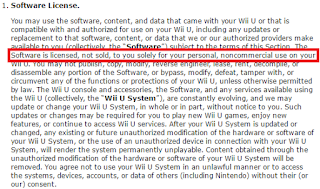The topic I choose was whether or not game publishing
companies have the right to take revenue derived from content creators, because
their game (software) is used in the creation of the content. Game content creators essentially play games with commentaries and interact with the viewers on video hosting sites. The amount of money they make depends on the amount of views as the revenue is derived from ads. The more traffic the more earnings. Some content creators have large followings and make quite a bit off the traffic. Game publishers argue their games (software) are a large part of the "content" and they are entitled to a portion of ad revenue. The philosopher I choose was Robert Nozick.
·
Some people steal from others, or
defraud them, or enslave them, seizing their product and preventing them from
living as they choose, or forcibly exclude others from competing in
exchanges. None of these are permissible modes of transition from one
situation to another.
·
Ch. 7 : Distributive Justice,
Section I, The Entitlement Theory, p. 152
·
Whoever makes something having bought
or contracted for all other held resources used in the process (transferring
some of his holdings for these cooperating factors), is entitled to it. The
situation is not one of something’s getting made, and there being an open
question of who is to get it. Things come into the world already attached to
people having entitlements over them.
·
Ch. 7 : Distributive Justice,
Section I, Patterning, p. 160
Nozick would argue that game publishers have the right to
ask for a piece of the revenue derived from ads. Since the publishers were the
ones that “bought or contracted for all other held resources used in the process” of creating the game (software).
The content in question is not only the game, but also the
commentary and community as well. The content creator as well has “bought or contracted
for all other held resources used in the process” in creation of the content and community. The game (software) may be a large
part of the content, but it is only a tool, a “resource” in the creation
of the content. One that the content creator has “bought”.
Nozick would say the EULA states that buying the game
(software), you are granted personal non-commercial use of the software. You do
not own the software as that is the IP of the publisher.
The definition of non-commercial use is
blurry and depends on how one perceives it. Non-Commercial
Use - “not primarily intended for or directed towards commercial
advantage or monetary compensation. The inclusion of “primarily” in the
definition recognizes that no activity is completely disconnected from
commercial activity; it is only the primary purpose of the reuse that needs to
be considered.”
The revenue for content creators come in the form of views.
Most viewers do not watch these videos for the game as they are gamers themselves and probably own the very same game.The commentary, the interaction, and the community that revolves around that specific content creator is what the viewer seeks, entertainment. The “primary” purpose/intent of the channel is
entertainment.
It is true that there are content creators out there that
make enough to call it a job, but it was not through what Nozick would consider
impermissible. “Some people steal from
others, or defraud them, or enslave them, seizing their product and preventing
them from living as they choose, or forcibly exclude others from competing in
exchanges.” The content creators did not steal, defraud, enslave, or seize the game publishers or their software.


No comments:
Post a Comment